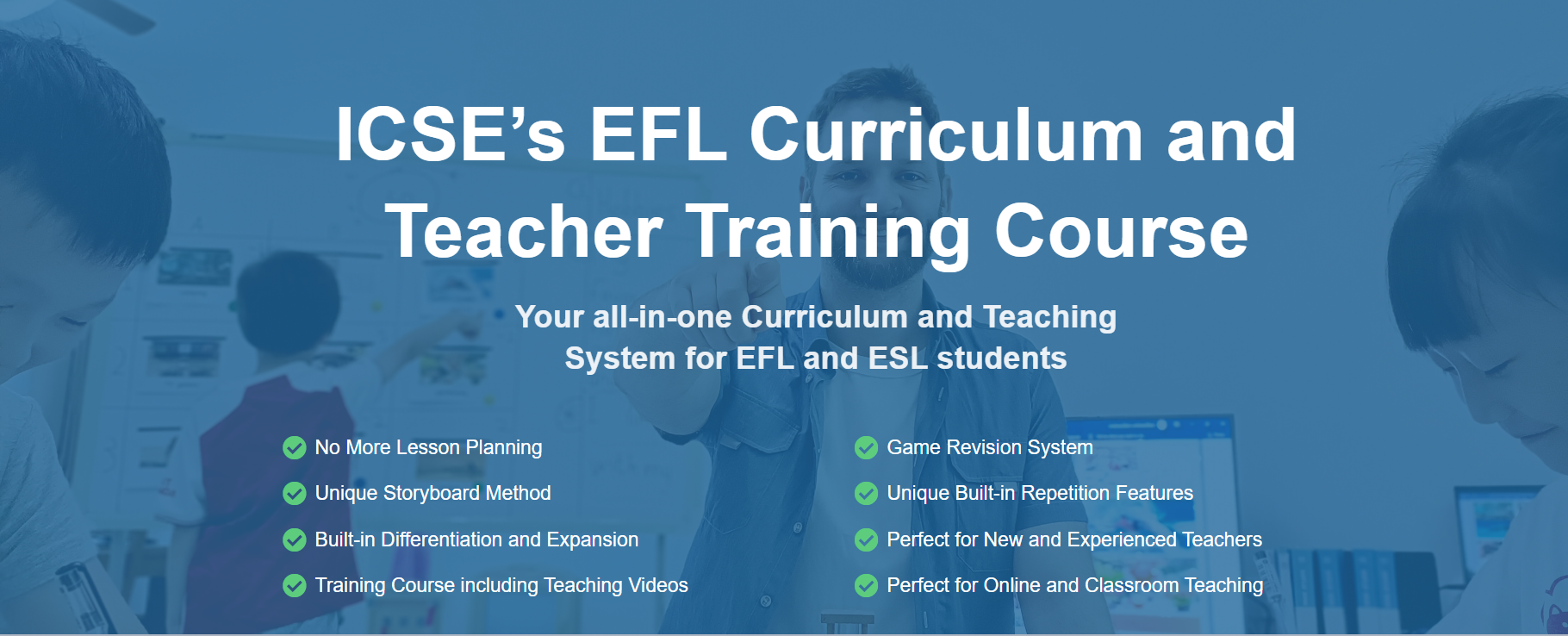Interested in starting your own entrepreneurial journey but unsure what to expect? Then read up on our interview with Andrew Cilliers, founder of ICSE Curriculum, located in Dongguan, Guangdong, China.
What's your business, and who are your customers?
I've developed a curriculum and a teacher training course for EFL (English as a Foreign Language) and ESL (English as a Second Language) teachers.
In a nutshell, the main purpose of the ICSE (I Can Speak English) Curriculum is to give EFL and ESL students the best possible chance of retaining learnt content through creative repetition. The ICSE Curriculum provides teachers with 4 to 5 years' worth of quality content to present in an easy-to-follow step-by-step fashion to a diverse group of students.
The ICSE Teacher Training Course is an in-depth course covering everything a teacher needs to know about teaching this curriculum to EFL or ESL students. It's practical and insightful for both new and experienced teachers. It's very simple for new teachers to follow and shows in detail how to implement each section of a unit, how to set up your classroom, and how to consistently achieve a high level of classroom management. It also shows how to implement more advanced teaching concepts such as differentiation and expansion.
Theirs is no shortage of teaching material out there for EFL and ESL teachers. So, what makes the ICSE Curriculum unique? Two main things:
- The curriculum is designed in a way that makes it simple for teachers to implement differentiation and expansion in real-time to a diverse group of students in the same class without needing to make extra materials.
- 3 Unique Built-in Repetition Features:
-(A) 'Short Term' Repetition (within each unit.)
-(B) 'Medium Term' Repetition (between units), featuring the Game Revision System.
-(C) 'Long Term' Repetition (between levels.)
Why is creative repetition so important? To better understand our approach, it's best to understand how the brain works when learning something new.
The brain works like this. Learning something new means re-arranging the way our brains work. Our brain has a hundred billion brain cells all connected together. Learning is about creating and strengthening pathways through these brain cells for impulses of electricity. But between each and every connection in our brains, there is a tiny gap called a synapse.
For any of us to learn something new, the electrical signal has to jump across this gap to continue its trip. It's like building a bridge over a river. Starting to build the bridge is very difficult. The first time a signal crosses from one brain cell to the other is the most difficult, and it is the same when starting to build the first section of a bridge. But after the first section, it gets easier, and a bridge starts forming. Then day after day, with more and more work, it gets stronger until it's finished, and it's effortless to cross the river – hooray! New information has successfully been transferred from short-term memory to long-term memory. Therefore, if there is no constructive repetition built into a curriculum, it will be very easy to forget newly learnt information.
The ICSE Curriculum works like this. The ICSE Curriculum incorporates constructive and continuous repetition to remind students of learnt content frequently so that maximum retention takes place.
A simple example:
- A student learns a new word and tries to remember it, but five minutes later, it's forgotten. If the student were to be reminded of it within five minutes, it would be remembered for longer. After that, the student would need another reminder.
- Each time the student is reminded, he or she remembers the word for longer until he or she remembers the word without being reminded because the new word has been transferred from their short to long-term memory.
- Each time a student begins to forget learnt content, chances are they'll be reminded of it through one of the three main revision features.
With this remarkably effective method, newly learnt content progresses from short to long-term memory more effectively.

Tell us about yourself
My name is Andrew Colin Cilliers. I came to Asia to teach English in 2005. Since then, I've taught children and adults from all over the world. I've taught both online and in kindergartens, primary schools, language centres, and also privately.
I started teaching my own private students in 2008 and quickly realised that I was spending most of my time trying to find and organise the material to teach. I bought tons of EFL and ESL content online as well as mainstream curriculums but always faced the same problems:
- Much of the content wasn't relevant or interesting for my students and didn't match the level of my students. Some parts of a curriculum or course were too difficult, and other parts too easy – there wasn't a good enough balance. I was still spending most of my time trying to find and organise the material to teach.
- Not enough content. Especially with private classes, a teacher can get through a lot of content. Often, I was back at square one in a few months or a semester after going through most or all of what was offered. Another issue was that the content was often not well enough connected to previously learnt content. More often than not, it was once-off learning, and my students would forget previously learnt content too quickly.
I decided to start developing the ICSE Curriculum and Teaching System in 2010 to help solve the above problems. I spent five years developing it. During the development years, I was using it for my teaching to see what worked and what didn't. It was quite a process.
Since then, I've updated it a few times (and continue to do so) in an effort to create a curriculum and teaching system that is professional, extensive, and organised for teachers as well as fun, interesting, and educational for students.
What's your biggest accomplishment as a business owner?
Seeing how effective and useful people find my curriculum and training course. Speaking to and reading the feedback from teachers, parents, and students is immensely satisfying.
What's one of the hardest things that comes with being a business owner?
Keeping up with the ever-changing world. Things are moving so fast nowadays, especially with technology. It can be challenging to find the time to keep up with it all.
What are the top tips you'd give to anyone looking to start, run and grow a business today?
In no particular order:
- Be realistic, be honest with yourself, and leave no stone unturned.
- It would be best to have a business that revolves around something you are passionate about because running a business by yourself takes up plenty of time and is a lot of work, and that work is going to feel a lot more tedious if you are doing something you don't like.
- Outsource – If you're doing it all by yourself, it can be overwhelming. Making use of websites like Upwork or Fiver or something similar (even friends or family) can help big time.
Where can people find you and your business?
Website: https://www.eflcurriculum.com/
Facebook: https://www.facebook.com/ICSECurriculum
LinkedIn: https://www.linkedin.com/company/icse-curriculum/
If you like what you've read here and have your own story as a solo or small business entrepreneur that you'd like to share, then please answer these interview questions. We'd love to feature your journey on these pages.
Turn your craft into recurring revenue with Subkit. Start your subscription offering in minutes and supercharge it with growth levers. Get early access here.
